Employment Law 1: Mandatory Retirement in Canada - Legal and Ethical
VerifiedAdded on 2021/04/24
|10
|2999
|56
Essay
AI Summary
This essay examines the legal and ethical implications of mandatory retirement in Canada. It begins by defining mandatory retirement and its justification, then delves into the legal framework surrounding ageism and discrimination, referencing the Canadian Charter of Rights and Freedoms and provincial human rights codes. The essay analyzes both sides of the argument, exploring the benefits of mandatory retirement, such as creating job opportunities for younger workers and the potential for increased productivity, while also highlighting the ethical and legal arguments against it, including the lack of medical evidence supporting age-related decline and the increasing economic burden of an aging population. The author concludes that the arguments against mandatory retirement outweigh those in favor, advocating for its abolition in Canada. The essay provides a comprehensive overview of the complexities surrounding this issue and offers a well-reasoned perspective on the topic.
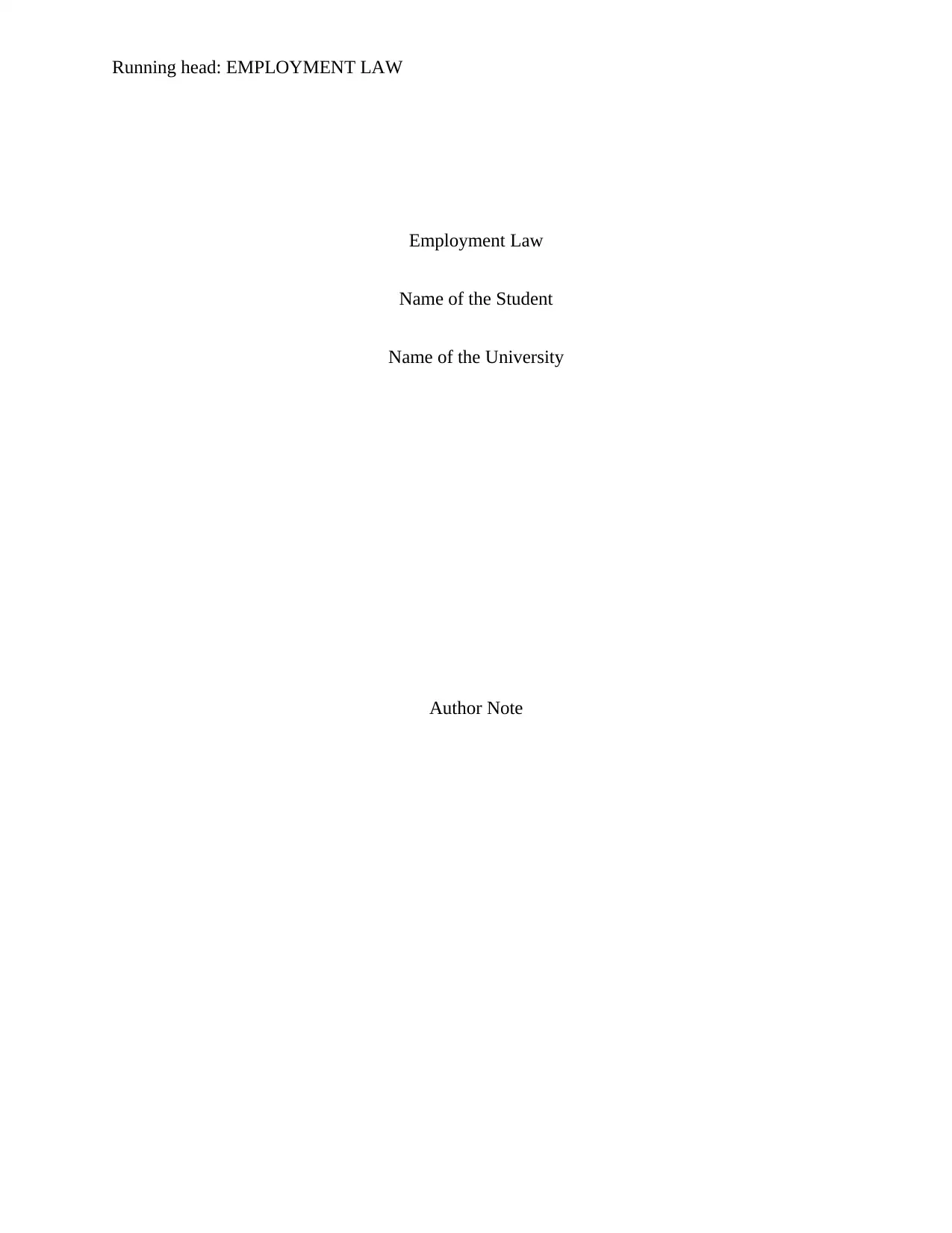
Running head: EMPLOYMENT LAW
Employment Law
Name of the Student
Name of the University
Author Note
Employment Law
Name of the Student
Name of the University
Author Note
Paraphrase This Document
Need a fresh take? Get an instant paraphrase of this document with our AI Paraphraser
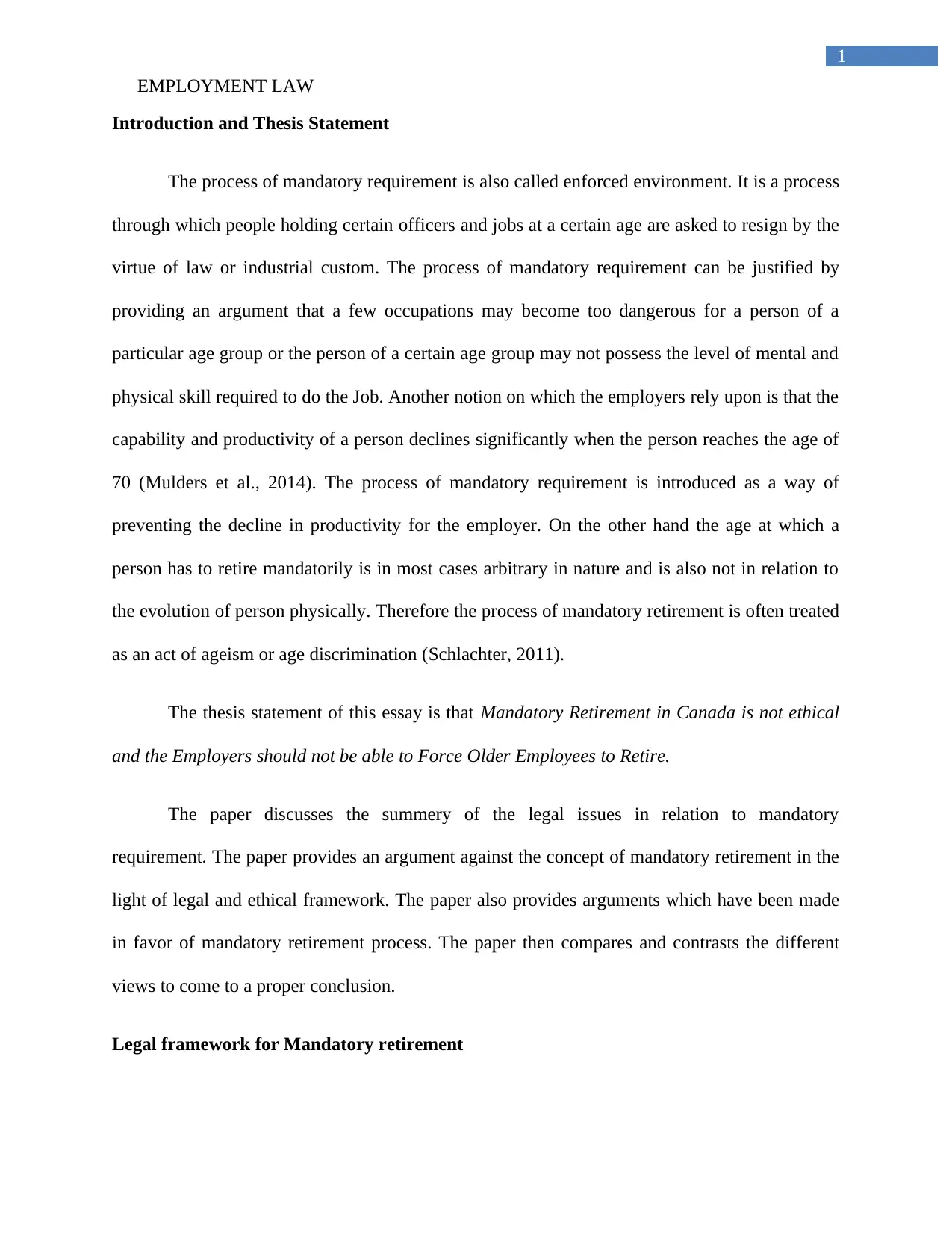
1
EMPLOYMENT LAW
Introduction and Thesis Statement
The process of mandatory requirement is also called enforced environment. It is a process
through which people holding certain officers and jobs at a certain age are asked to resign by the
virtue of law or industrial custom. The process of mandatory requirement can be justified by
providing an argument that a few occupations may become too dangerous for a person of a
particular age group or the person of a certain age group may not possess the level of mental and
physical skill required to do the Job. Another notion on which the employers rely upon is that the
capability and productivity of a person declines significantly when the person reaches the age of
70 (Mulders et al., 2014). The process of mandatory requirement is introduced as a way of
preventing the decline in productivity for the employer. On the other hand the age at which a
person has to retire mandatorily is in most cases arbitrary in nature and is also not in relation to
the evolution of person physically. Therefore the process of mandatory retirement is often treated
as an act of ageism or age discrimination (Schlachter, 2011).
The thesis statement of this essay is that Mandatory Retirement in Canada is not ethical
and the Employers should not be able to Force Older Employees to Retire.
The paper discusses the summery of the legal issues in relation to mandatory
requirement. The paper provides an argument against the concept of mandatory retirement in the
light of legal and ethical framework. The paper also provides arguments which have been made
in favor of mandatory retirement process. The paper then compares and contrasts the different
views to come to a proper conclusion.
Legal framework for Mandatory retirement
EMPLOYMENT LAW
Introduction and Thesis Statement
The process of mandatory requirement is also called enforced environment. It is a process
through which people holding certain officers and jobs at a certain age are asked to resign by the
virtue of law or industrial custom. The process of mandatory requirement can be justified by
providing an argument that a few occupations may become too dangerous for a person of a
particular age group or the person of a certain age group may not possess the level of mental and
physical skill required to do the Job. Another notion on which the employers rely upon is that the
capability and productivity of a person declines significantly when the person reaches the age of
70 (Mulders et al., 2014). The process of mandatory requirement is introduced as a way of
preventing the decline in productivity for the employer. On the other hand the age at which a
person has to retire mandatorily is in most cases arbitrary in nature and is also not in relation to
the evolution of person physically. Therefore the process of mandatory retirement is often treated
as an act of ageism or age discrimination (Schlachter, 2011).
The thesis statement of this essay is that Mandatory Retirement in Canada is not ethical
and the Employers should not be able to Force Older Employees to Retire.
The paper discusses the summery of the legal issues in relation to mandatory
requirement. The paper provides an argument against the concept of mandatory retirement in the
light of legal and ethical framework. The paper also provides arguments which have been made
in favor of mandatory retirement process. The paper then compares and contrasts the different
views to come to a proper conclusion.
Legal framework for Mandatory retirement
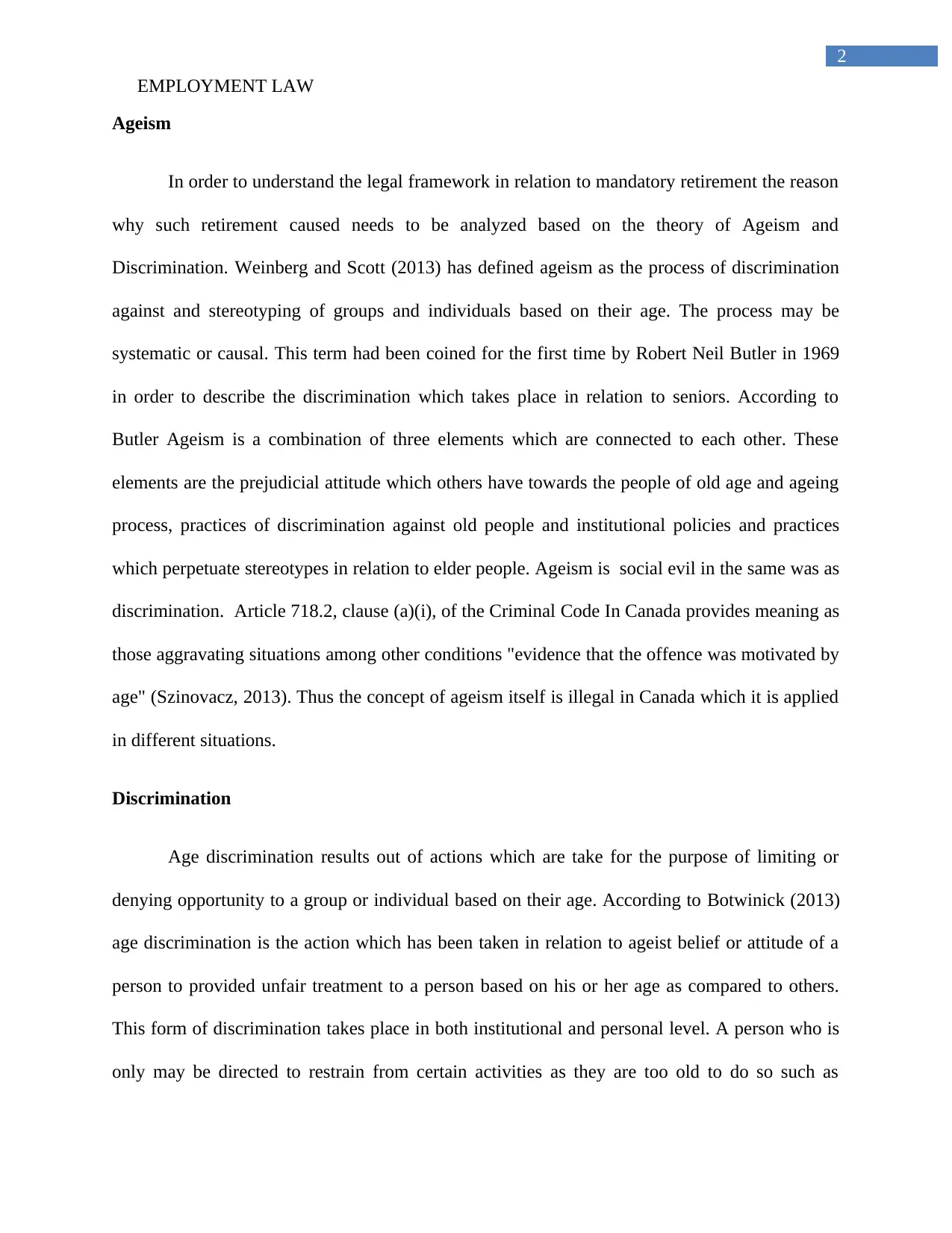
2
EMPLOYMENT LAW
Ageism
In order to understand the legal framework in relation to mandatory retirement the reason
why such retirement caused needs to be analyzed based on the theory of Ageism and
Discrimination. Weinberg and Scott (2013) has defined ageism as the process of discrimination
against and stereotyping of groups and individuals based on their age. The process may be
systematic or causal. This term had been coined for the first time by Robert Neil Butler in 1969
in order to describe the discrimination which takes place in relation to seniors. According to
Butler Ageism is a combination of three elements which are connected to each other. These
elements are the prejudicial attitude which others have towards the people of old age and ageing
process, practices of discrimination against old people and institutional policies and practices
which perpetuate stereotypes in relation to elder people. Ageism is social evil in the same was as
discrimination. Article 718.2, clause (a)(i), of the Criminal Code In Canada provides meaning as
those aggravating situations among other conditions "evidence that the offence was motivated by
age" (Szinovacz, 2013). Thus the concept of ageism itself is illegal in Canada which it is applied
in different situations.
Discrimination
Age discrimination results out of actions which are take for the purpose of limiting or
denying opportunity to a group or individual based on their age. According to Botwinick (2013)
age discrimination is the action which has been taken in relation to ageist belief or attitude of a
person to provided unfair treatment to a person based on his or her age as compared to others.
This form of discrimination takes place in both institutional and personal level. A person who is
only may be directed to restrain from certain activities as they are too old to do so such as
EMPLOYMENT LAW
Ageism
In order to understand the legal framework in relation to mandatory retirement the reason
why such retirement caused needs to be analyzed based on the theory of Ageism and
Discrimination. Weinberg and Scott (2013) has defined ageism as the process of discrimination
against and stereotyping of groups and individuals based on their age. The process may be
systematic or causal. This term had been coined for the first time by Robert Neil Butler in 1969
in order to describe the discrimination which takes place in relation to seniors. According to
Butler Ageism is a combination of three elements which are connected to each other. These
elements are the prejudicial attitude which others have towards the people of old age and ageing
process, practices of discrimination against old people and institutional policies and practices
which perpetuate stereotypes in relation to elder people. Ageism is social evil in the same was as
discrimination. Article 718.2, clause (a)(i), of the Criminal Code In Canada provides meaning as
those aggravating situations among other conditions "evidence that the offence was motivated by
age" (Szinovacz, 2013). Thus the concept of ageism itself is illegal in Canada which it is applied
in different situations.
Discrimination
Age discrimination results out of actions which are take for the purpose of limiting or
denying opportunity to a group or individual based on their age. According to Botwinick (2013)
age discrimination is the action which has been taken in relation to ageist belief or attitude of a
person to provided unfair treatment to a person based on his or her age as compared to others.
This form of discrimination takes place in both institutional and personal level. A person who is
only may be directed to restrain from certain activities as they are too old to do so such as
⊘ This is a preview!⊘
Do you want full access?
Subscribe today to unlock all pages.

Trusted by 1+ million students worldwide
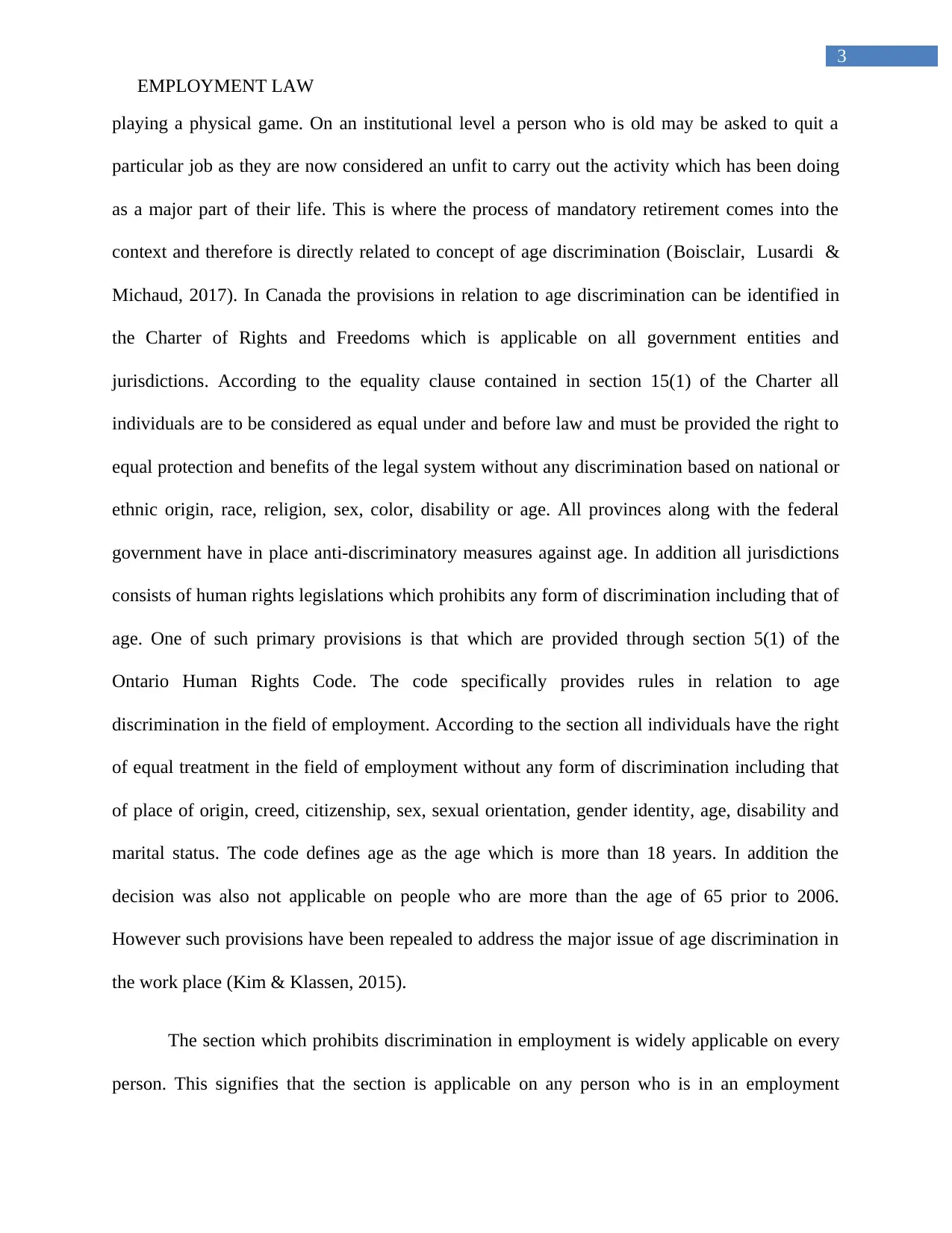
3
EMPLOYMENT LAW
playing a physical game. On an institutional level a person who is old may be asked to quit a
particular job as they are now considered an unfit to carry out the activity which has been doing
as a major part of their life. This is where the process of mandatory retirement comes into the
context and therefore is directly related to concept of age discrimination (Boisclair, Lusardi &
Michaud, 2017). In Canada the provisions in relation to age discrimination can be identified in
the Charter of Rights and Freedoms which is applicable on all government entities and
jurisdictions. According to the equality clause contained in section 15(1) of the Charter all
individuals are to be considered as equal under and before law and must be provided the right to
equal protection and benefits of the legal system without any discrimination based on national or
ethnic origin, race, religion, sex, color, disability or age. All provinces along with the federal
government have in place anti-discriminatory measures against age. In addition all jurisdictions
consists of human rights legislations which prohibits any form of discrimination including that of
age. One of such primary provisions is that which are provided through section 5(1) of the
Ontario Human Rights Code. The code specifically provides rules in relation to age
discrimination in the field of employment. According to the section all individuals have the right
of equal treatment in the field of employment without any form of discrimination including that
of place of origin, creed, citizenship, sex, sexual orientation, gender identity, age, disability and
marital status. The code defines age as the age which is more than 18 years. In addition the
decision was also not applicable on people who are more than the age of 65 prior to 2006.
However such provisions have been repealed to address the major issue of age discrimination in
the work place (Kim & Klassen, 2015).
The section which prohibits discrimination in employment is widely applicable on every
person. This signifies that the section is applicable on any person who is in an employment
EMPLOYMENT LAW
playing a physical game. On an institutional level a person who is old may be asked to quit a
particular job as they are now considered an unfit to carry out the activity which has been doing
as a major part of their life. This is where the process of mandatory retirement comes into the
context and therefore is directly related to concept of age discrimination (Boisclair, Lusardi &
Michaud, 2017). In Canada the provisions in relation to age discrimination can be identified in
the Charter of Rights and Freedoms which is applicable on all government entities and
jurisdictions. According to the equality clause contained in section 15(1) of the Charter all
individuals are to be considered as equal under and before law and must be provided the right to
equal protection and benefits of the legal system without any discrimination based on national or
ethnic origin, race, religion, sex, color, disability or age. All provinces along with the federal
government have in place anti-discriminatory measures against age. In addition all jurisdictions
consists of human rights legislations which prohibits any form of discrimination including that of
age. One of such primary provisions is that which are provided through section 5(1) of the
Ontario Human Rights Code. The code specifically provides rules in relation to age
discrimination in the field of employment. According to the section all individuals have the right
of equal treatment in the field of employment without any form of discrimination including that
of place of origin, creed, citizenship, sex, sexual orientation, gender identity, age, disability and
marital status. The code defines age as the age which is more than 18 years. In addition the
decision was also not applicable on people who are more than the age of 65 prior to 2006.
However such provisions have been repealed to address the major issue of age discrimination in
the work place (Kim & Klassen, 2015).
The section which prohibits discrimination in employment is widely applicable on every
person. This signifies that the section is applicable on any person who is in an employment
Paraphrase This Document
Need a fresh take? Get an instant paraphrase of this document with our AI Paraphraser
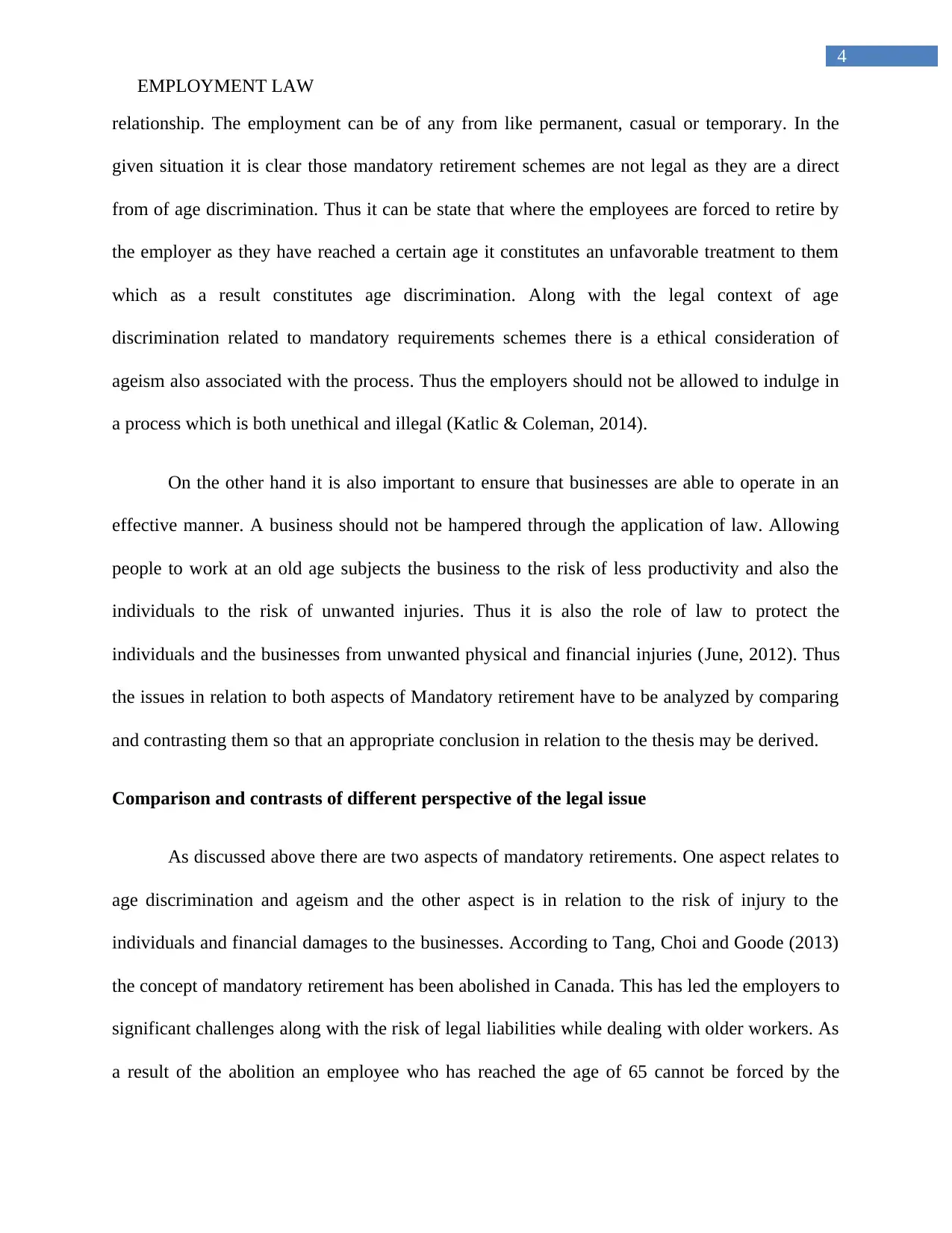
4
EMPLOYMENT LAW
relationship. The employment can be of any from like permanent, casual or temporary. In the
given situation it is clear those mandatory retirement schemes are not legal as they are a direct
from of age discrimination. Thus it can be state that where the employees are forced to retire by
the employer as they have reached a certain age it constitutes an unfavorable treatment to them
which as a result constitutes age discrimination. Along with the legal context of age
discrimination related to mandatory requirements schemes there is a ethical consideration of
ageism also associated with the process. Thus the employers should not be allowed to indulge in
a process which is both unethical and illegal (Katlic & Coleman, 2014).
On the other hand it is also important to ensure that businesses are able to operate in an
effective manner. A business should not be hampered through the application of law. Allowing
people to work at an old age subjects the business to the risk of less productivity and also the
individuals to the risk of unwanted injuries. Thus it is also the role of law to protect the
individuals and the businesses from unwanted physical and financial injuries (June, 2012). Thus
the issues in relation to both aspects of Mandatory retirement have to be analyzed by comparing
and contrasting them so that an appropriate conclusion in relation to the thesis may be derived.
Comparison and contrasts of different perspective of the legal issue
As discussed above there are two aspects of mandatory retirements. One aspect relates to
age discrimination and ageism and the other aspect is in relation to the risk of injury to the
individuals and financial damages to the businesses. According to Tang, Choi and Goode (2013)
the concept of mandatory retirement has been abolished in Canada. This has led the employers to
significant challenges along with the risk of legal liabilities while dealing with older workers. As
a result of the abolition an employee who has reached the age of 65 cannot be forced by the
EMPLOYMENT LAW
relationship. The employment can be of any from like permanent, casual or temporary. In the
given situation it is clear those mandatory retirement schemes are not legal as they are a direct
from of age discrimination. Thus it can be state that where the employees are forced to retire by
the employer as they have reached a certain age it constitutes an unfavorable treatment to them
which as a result constitutes age discrimination. Along with the legal context of age
discrimination related to mandatory requirements schemes there is a ethical consideration of
ageism also associated with the process. Thus the employers should not be allowed to indulge in
a process which is both unethical and illegal (Katlic & Coleman, 2014).
On the other hand it is also important to ensure that businesses are able to operate in an
effective manner. A business should not be hampered through the application of law. Allowing
people to work at an old age subjects the business to the risk of less productivity and also the
individuals to the risk of unwanted injuries. Thus it is also the role of law to protect the
individuals and the businesses from unwanted physical and financial injuries (June, 2012). Thus
the issues in relation to both aspects of Mandatory retirement have to be analyzed by comparing
and contrasting them so that an appropriate conclusion in relation to the thesis may be derived.
Comparison and contrasts of different perspective of the legal issue
As discussed above there are two aspects of mandatory retirements. One aspect relates to
age discrimination and ageism and the other aspect is in relation to the risk of injury to the
individuals and financial damages to the businesses. According to Tang, Choi and Goode (2013)
the concept of mandatory retirement has been abolished in Canada. This has led the employers to
significant challenges along with the risk of legal liabilities while dealing with older workers. As
a result of the abolition an employee who has reached the age of 65 cannot be forced by the
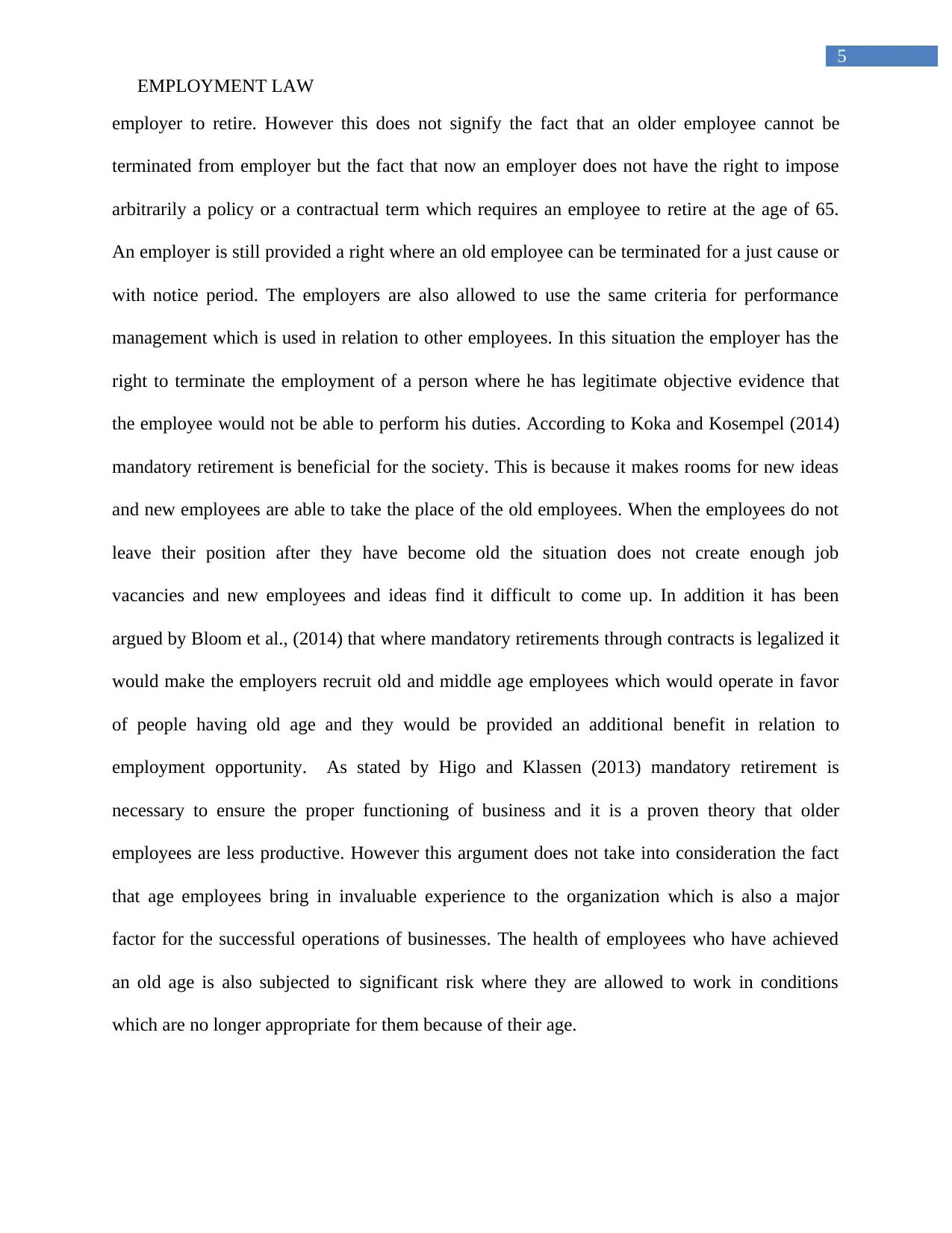
5
EMPLOYMENT LAW
employer to retire. However this does not signify the fact that an older employee cannot be
terminated from employer but the fact that now an employer does not have the right to impose
arbitrarily a policy or a contractual term which requires an employee to retire at the age of 65.
An employer is still provided a right where an old employee can be terminated for a just cause or
with notice period. The employers are also allowed to use the same criteria for performance
management which is used in relation to other employees. In this situation the employer has the
right to terminate the employment of a person where he has legitimate objective evidence that
the employee would not be able to perform his duties. According to Koka and Kosempel (2014)
mandatory retirement is beneficial for the society. This is because it makes rooms for new ideas
and new employees are able to take the place of the old employees. When the employees do not
leave their position after they have become old the situation does not create enough job
vacancies and new employees and ideas find it difficult to come up. In addition it has been
argued by Bloom et al., (2014) that where mandatory retirements through contracts is legalized it
would make the employers recruit old and middle age employees which would operate in favor
of people having old age and they would be provided an additional benefit in relation to
employment opportunity. As stated by Higo and Klassen (2013) mandatory retirement is
necessary to ensure the proper functioning of business and it is a proven theory that older
employees are less productive. However this argument does not take into consideration the fact
that age employees bring in invaluable experience to the organization which is also a major
factor for the successful operations of businesses. The health of employees who have achieved
an old age is also subjected to significant risk where they are allowed to work in conditions
which are no longer appropriate for them because of their age.
EMPLOYMENT LAW
employer to retire. However this does not signify the fact that an older employee cannot be
terminated from employer but the fact that now an employer does not have the right to impose
arbitrarily a policy or a contractual term which requires an employee to retire at the age of 65.
An employer is still provided a right where an old employee can be terminated for a just cause or
with notice period. The employers are also allowed to use the same criteria for performance
management which is used in relation to other employees. In this situation the employer has the
right to terminate the employment of a person where he has legitimate objective evidence that
the employee would not be able to perform his duties. According to Koka and Kosempel (2014)
mandatory retirement is beneficial for the society. This is because it makes rooms for new ideas
and new employees are able to take the place of the old employees. When the employees do not
leave their position after they have become old the situation does not create enough job
vacancies and new employees and ideas find it difficult to come up. In addition it has been
argued by Bloom et al., (2014) that where mandatory retirements through contracts is legalized it
would make the employers recruit old and middle age employees which would operate in favor
of people having old age and they would be provided an additional benefit in relation to
employment opportunity. As stated by Higo and Klassen (2013) mandatory retirement is
necessary to ensure the proper functioning of business and it is a proven theory that older
employees are less productive. However this argument does not take into consideration the fact
that age employees bring in invaluable experience to the organization which is also a major
factor for the successful operations of businesses. The health of employees who have achieved
an old age is also subjected to significant risk where they are allowed to work in conditions
which are no longer appropriate for them because of their age.
⊘ This is a preview!⊘
Do you want full access?
Subscribe today to unlock all pages.

Trusted by 1+ million students worldwide
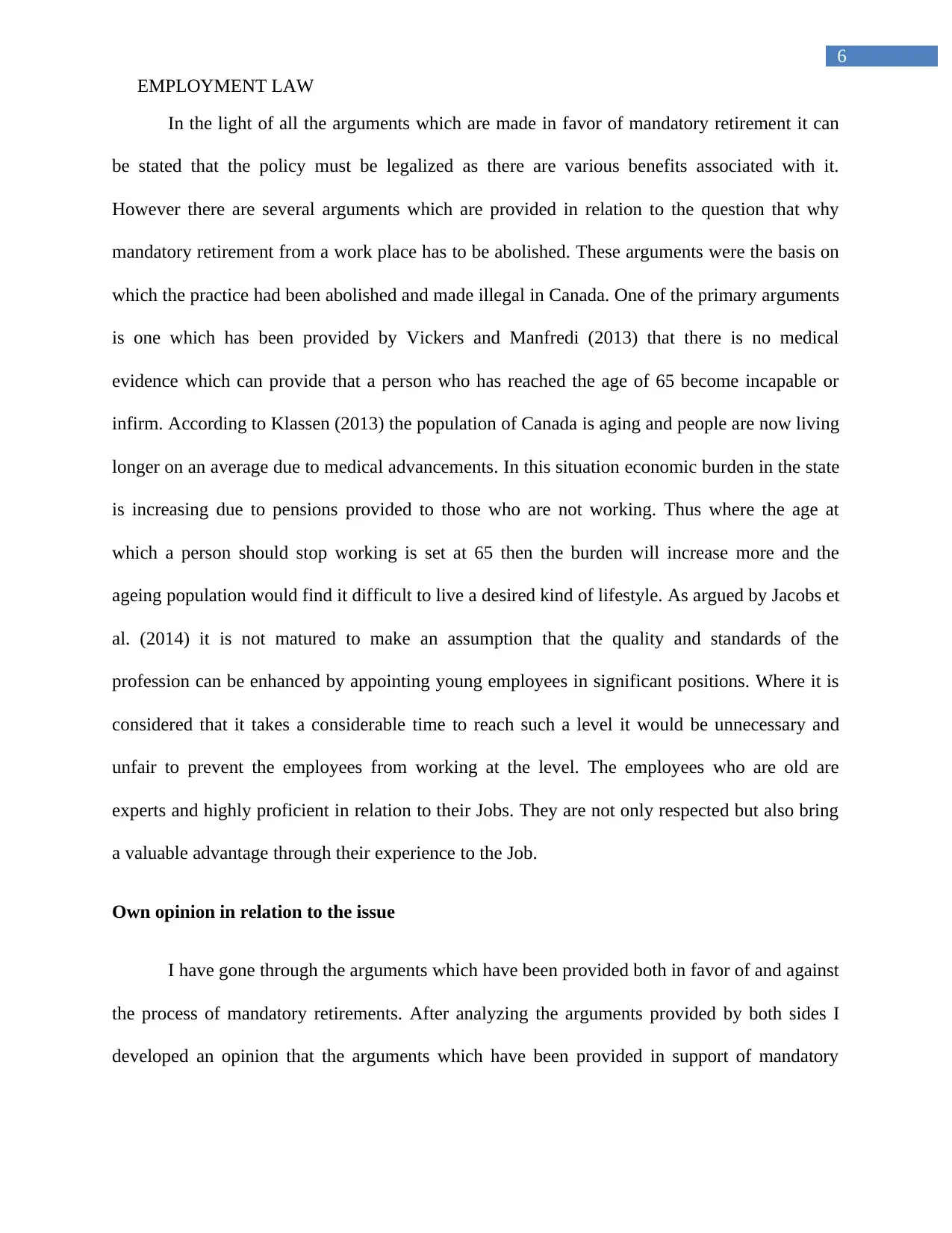
6
EMPLOYMENT LAW
In the light of all the arguments which are made in favor of mandatory retirement it can
be stated that the policy must be legalized as there are various benefits associated with it.
However there are several arguments which are provided in relation to the question that why
mandatory retirement from a work place has to be abolished. These arguments were the basis on
which the practice had been abolished and made illegal in Canada. One of the primary arguments
is one which has been provided by Vickers and Manfredi (2013) that there is no medical
evidence which can provide that a person who has reached the age of 65 become incapable or
infirm. According to Klassen (2013) the population of Canada is aging and people are now living
longer on an average due to medical advancements. In this situation economic burden in the state
is increasing due to pensions provided to those who are not working. Thus where the age at
which a person should stop working is set at 65 then the burden will increase more and the
ageing population would find it difficult to live a desired kind of lifestyle. As argued by Jacobs et
al. (2014) it is not matured to make an assumption that the quality and standards of the
profession can be enhanced by appointing young employees in significant positions. Where it is
considered that it takes a considerable time to reach such a level it would be unnecessary and
unfair to prevent the employees from working at the level. The employees who are old are
experts and highly proficient in relation to their Jobs. They are not only respected but also bring
a valuable advantage through their experience to the Job.
Own opinion in relation to the issue
I have gone through the arguments which have been provided both in favor of and against
the process of mandatory retirements. After analyzing the arguments provided by both sides I
developed an opinion that the arguments which have been provided in support of mandatory
EMPLOYMENT LAW
In the light of all the arguments which are made in favor of mandatory retirement it can
be stated that the policy must be legalized as there are various benefits associated with it.
However there are several arguments which are provided in relation to the question that why
mandatory retirement from a work place has to be abolished. These arguments were the basis on
which the practice had been abolished and made illegal in Canada. One of the primary arguments
is one which has been provided by Vickers and Manfredi (2013) that there is no medical
evidence which can provide that a person who has reached the age of 65 become incapable or
infirm. According to Klassen (2013) the population of Canada is aging and people are now living
longer on an average due to medical advancements. In this situation economic burden in the state
is increasing due to pensions provided to those who are not working. Thus where the age at
which a person should stop working is set at 65 then the burden will increase more and the
ageing population would find it difficult to live a desired kind of lifestyle. As argued by Jacobs et
al. (2014) it is not matured to make an assumption that the quality and standards of the
profession can be enhanced by appointing young employees in significant positions. Where it is
considered that it takes a considerable time to reach such a level it would be unnecessary and
unfair to prevent the employees from working at the level. The employees who are old are
experts and highly proficient in relation to their Jobs. They are not only respected but also bring
a valuable advantage through their experience to the Job.
Own opinion in relation to the issue
I have gone through the arguments which have been provided both in favor of and against
the process of mandatory retirements. After analyzing the arguments provided by both sides I
developed an opinion that the arguments which have been provided in support of mandatory
Paraphrase This Document
Need a fresh take? Get an instant paraphrase of this document with our AI Paraphraser
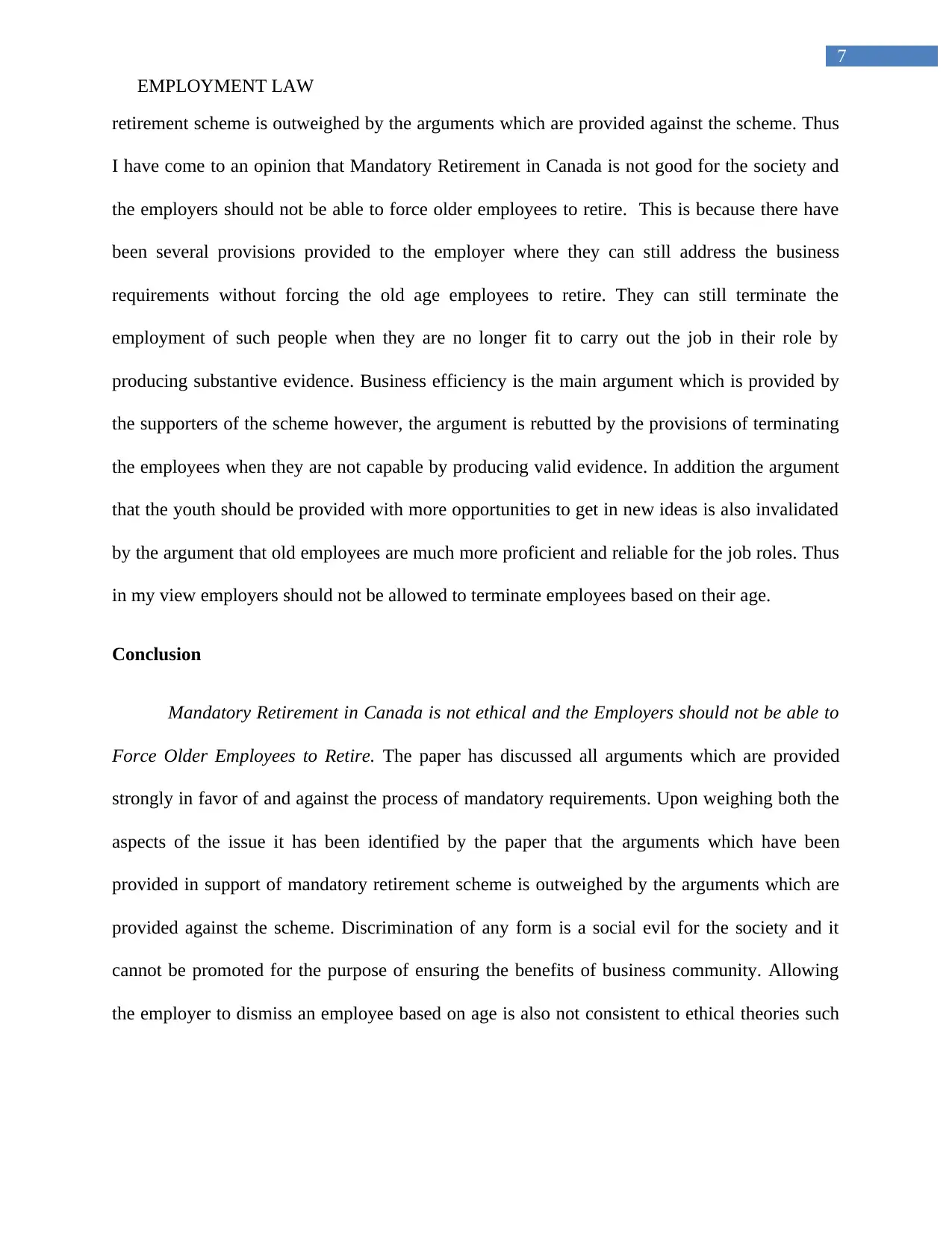
7
EMPLOYMENT LAW
retirement scheme is outweighed by the arguments which are provided against the scheme. Thus
I have come to an opinion that Mandatory Retirement in Canada is not good for the society and
the employers should not be able to force older employees to retire. This is because there have
been several provisions provided to the employer where they can still address the business
requirements without forcing the old age employees to retire. They can still terminate the
employment of such people when they are no longer fit to carry out the job in their role by
producing substantive evidence. Business efficiency is the main argument which is provided by
the supporters of the scheme however, the argument is rebutted by the provisions of terminating
the employees when they are not capable by producing valid evidence. In addition the argument
that the youth should be provided with more opportunities to get in new ideas is also invalidated
by the argument that old employees are much more proficient and reliable for the job roles. Thus
in my view employers should not be allowed to terminate employees based on their age.
Conclusion
Mandatory Retirement in Canada is not ethical and the Employers should not be able to
Force Older Employees to Retire. The paper has discussed all arguments which are provided
strongly in favor of and against the process of mandatory requirements. Upon weighing both the
aspects of the issue it has been identified by the paper that the arguments which have been
provided in support of mandatory retirement scheme is outweighed by the arguments which are
provided against the scheme. Discrimination of any form is a social evil for the society and it
cannot be promoted for the purpose of ensuring the benefits of business community. Allowing
the employer to dismiss an employee based on age is also not consistent to ethical theories such
EMPLOYMENT LAW
retirement scheme is outweighed by the arguments which are provided against the scheme. Thus
I have come to an opinion that Mandatory Retirement in Canada is not good for the society and
the employers should not be able to force older employees to retire. This is because there have
been several provisions provided to the employer where they can still address the business
requirements without forcing the old age employees to retire. They can still terminate the
employment of such people when they are no longer fit to carry out the job in their role by
producing substantive evidence. Business efficiency is the main argument which is provided by
the supporters of the scheme however, the argument is rebutted by the provisions of terminating
the employees when they are not capable by producing valid evidence. In addition the argument
that the youth should be provided with more opportunities to get in new ideas is also invalidated
by the argument that old employees are much more proficient and reliable for the job roles. Thus
in my view employers should not be allowed to terminate employees based on their age.
Conclusion
Mandatory Retirement in Canada is not ethical and the Employers should not be able to
Force Older Employees to Retire. The paper has discussed all arguments which are provided
strongly in favor of and against the process of mandatory requirements. Upon weighing both the
aspects of the issue it has been identified by the paper that the arguments which have been
provided in support of mandatory retirement scheme is outweighed by the arguments which are
provided against the scheme. Discrimination of any form is a social evil for the society and it
cannot be promoted for the purpose of ensuring the benefits of business community. Allowing
the employer to dismiss an employee based on age is also not consistent to ethical theories such

8
EMPLOYMENT LAW
as deontology and utilitarianism. Thus the Canadian government is correct in its approach to
abolish the practice for the betterment of the society.
EMPLOYMENT LAW
as deontology and utilitarianism. Thus the Canadian government is correct in its approach to
abolish the practice for the betterment of the society.
⊘ This is a preview!⊘
Do you want full access?
Subscribe today to unlock all pages.

Trusted by 1+ million students worldwide
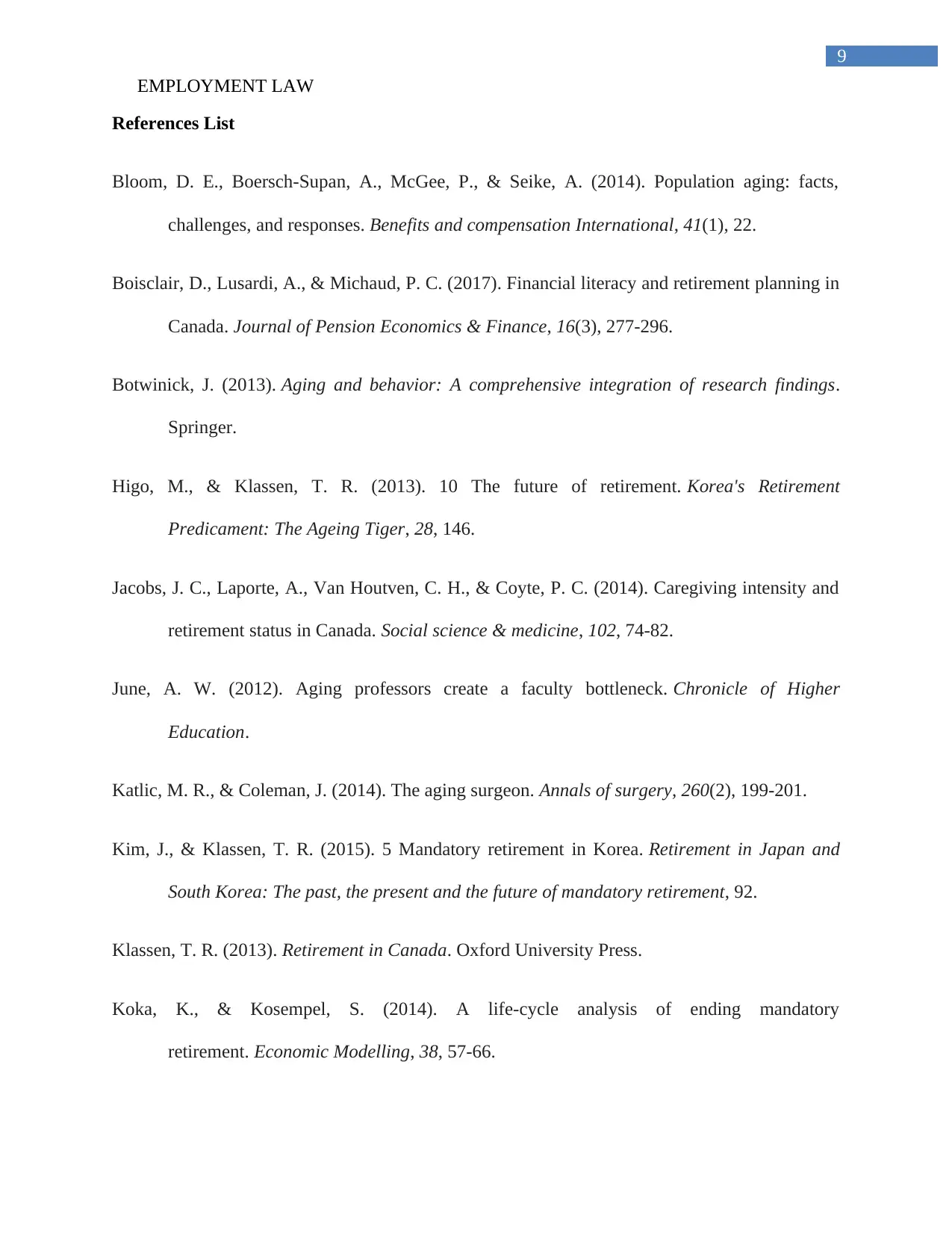
9
EMPLOYMENT LAW
References List
Bloom, D. E., Boersch-Supan, A., McGee, P., & Seike, A. (2014). Population aging: facts,
challenges, and responses. Benefits and compensation International, 41(1), 22.
Boisclair, D., Lusardi, A., & Michaud, P. C. (2017). Financial literacy and retirement planning in
Canada. Journal of Pension Economics & Finance, 16(3), 277-296.
Botwinick, J. (2013). Aging and behavior: A comprehensive integration of research findings.
Springer.
Higo, M., & Klassen, T. R. (2013). 10 The future of retirement. Korea's Retirement
Predicament: The Ageing Tiger, 28, 146.
Jacobs, J. C., Laporte, A., Van Houtven, C. H., & Coyte, P. C. (2014). Caregiving intensity and
retirement status in Canada. Social science & medicine, 102, 74-82.
June, A. W. (2012). Aging professors create a faculty bottleneck. Chronicle of Higher
Education.
Katlic, M. R., & Coleman, J. (2014). The aging surgeon. Annals of surgery, 260(2), 199-201.
Kim, J., & Klassen, T. R. (2015). 5 Mandatory retirement in Korea. Retirement in Japan and
South Korea: The past, the present and the future of mandatory retirement, 92.
Klassen, T. R. (2013). Retirement in Canada. Oxford University Press.
Koka, K., & Kosempel, S. (2014). A life-cycle analysis of ending mandatory
retirement. Economic Modelling, 38, 57-66.
EMPLOYMENT LAW
References List
Bloom, D. E., Boersch-Supan, A., McGee, P., & Seike, A. (2014). Population aging: facts,
challenges, and responses. Benefits and compensation International, 41(1), 22.
Boisclair, D., Lusardi, A., & Michaud, P. C. (2017). Financial literacy and retirement planning in
Canada. Journal of Pension Economics & Finance, 16(3), 277-296.
Botwinick, J. (2013). Aging and behavior: A comprehensive integration of research findings.
Springer.
Higo, M., & Klassen, T. R. (2013). 10 The future of retirement. Korea's Retirement
Predicament: The Ageing Tiger, 28, 146.
Jacobs, J. C., Laporte, A., Van Houtven, C. H., & Coyte, P. C. (2014). Caregiving intensity and
retirement status in Canada. Social science & medicine, 102, 74-82.
June, A. W. (2012). Aging professors create a faculty bottleneck. Chronicle of Higher
Education.
Katlic, M. R., & Coleman, J. (2014). The aging surgeon. Annals of surgery, 260(2), 199-201.
Kim, J., & Klassen, T. R. (2015). 5 Mandatory retirement in Korea. Retirement in Japan and
South Korea: The past, the present and the future of mandatory retirement, 92.
Klassen, T. R. (2013). Retirement in Canada. Oxford University Press.
Koka, K., & Kosempel, S. (2014). A life-cycle analysis of ending mandatory
retirement. Economic Modelling, 38, 57-66.
1 out of 10
Related Documents
Your All-in-One AI-Powered Toolkit for Academic Success.
+13062052269
info@desklib.com
Available 24*7 on WhatsApp / Email
![[object Object]](/_next/static/media/star-bottom.7253800d.svg)
Unlock your academic potential
Copyright © 2020–2026 A2Z Services. All Rights Reserved. Developed and managed by ZUCOL.





